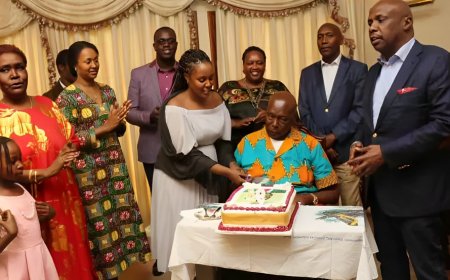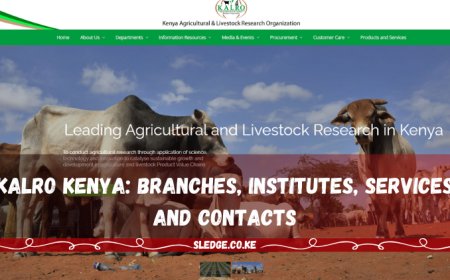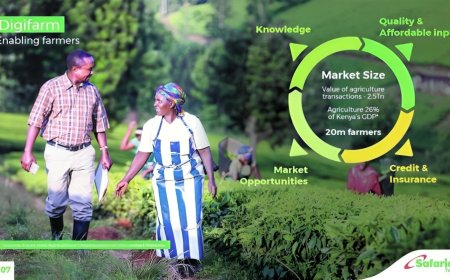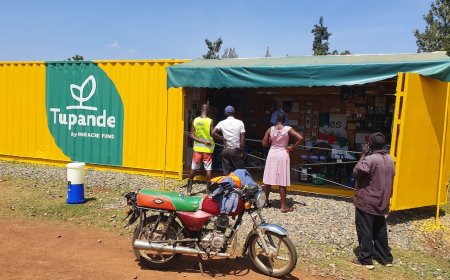KMTC fee structure for government sponsored students 2024
Explore the KMTC fee structure for government-sponsored students in 2024, covering year-wise fees, accommodation costs, and more

Welcome to an insightful exploration of the Kenya Medical Training College's (KMTC) fee structure for government-sponsored students for the academic year 2024. KMTC, a beacon of excellence in medical education in Kenya, plays a pivotal role in shaping the future of healthcare in the region. Every year, numerous aspiring medical professionals embark on their journey at KMTC, fuelled by a dream to make a difference in health and medicine.
Understanding the fee structure is crucial for many students, particularly government-sponsored students. It's more than just numbers; it's about planning your educational journey, knowing what financial commitments you're signing up for, and ensuring you're well-prepared to focus on your studies without undue stress. This comprehensive guide delves into the specifics of the KMTC fee structure. We'll break down the costs, explain how they're allocated throughout your educational journey, and provide budgeting and financial planning tips.
READ ALSO: Equity Wings to Fly Scholarship 2024: Eligibility, Application, Benefits, and Future Paths
Understanding KMTC Fee Structure for the First Year
Embarking on the first year at the Kenya Medical Training College (KMTC) is exciting and crucial, and understanding the fee structure is an integral part of this new journey. For government-sponsored students, the fee composition for the first academic year is meticulously structured to cover various aspects of their education.
The total fee for the first year is Kshs. 80,700.00, divided into several categories to ensure a comprehensive educational experience. Let's break down these fees:
- Registration Fees: Every new student must pay a registration fee of Kshs. 2,000.00. This standard charge is for processing your enrollment and officially registering you as a KMTC student.
- Activity Fees: Set at Kshs. 2,000.00, this fee facilitates various student activities, contributing to a well-rounded campus experience. It covers the costs associated with student events, sports, and other extracurricular activities crucial for holistic development.
- Examination Fees: With a charge of Kshs. 10,000.00, this fee is vital for your academic assessment. It covers the costs of administering exams and other evaluation processes, ensuring that students are tested relatively and effectively.
- Library & ICT Services Fees: An amount of Kshs. 4,000.00 is allocated for access to the library and ICT services. This fee supports the maintenance of library resources and the technology infrastructure, which is essential for your research and learning.
- Tuition Fees: The core of your educational expenses, tuition fees, amount to Kshs. 30,000.00. This covers the cost of your classes, lectures, and practical sessions, providing the backbone of your academic training at KMTC.
- Research & Development Fees: Amounting to Kshs. 10,000.00, this fee supports the development of new educational materials and research activities, keeping KMTC at the forefront of medical training.
- Transport Fee: This fee is set at Kshs. 12,000.00 is allocated for your transportation needs related to educational activities, like field trips and practical sessions outside the campus.
- Maintenance Levy/Fee: An amount of Kshs. 10,000.00 is charged for the upkeep and maintenance of campus facilities, ensuring a conducive learning environment.
- Student ID Card Fee: Lastly, a fee of Kshs. 700.00 is required for your student identification card, a crucial element for campus security and access to various services.
These fees are spread across two semesters, with slight variations in amounts per semester. In Semester 1, the total comes to Kshs. 41,700.00, while Semester 2 totals Kshs. 39,000.00. This structured payment plan aids in financial planning, allowing students to allocate funds appropriately across the academic year.
Semester 1
| Particulars | Amount |
| Registration fees | Kshs. 2000 |
| Activity fees | Kshs. 1000.00 |
| Examination fees | Kshs. 5000.00 |
| Library& ICT services fees | Kshs. 2000.00 |
| Tuition fees | Kshs. 15000.00 |
| Research & development fees | Kshs. 5000.00 |
| Transport fee | Kshs. 6000.00 |
| Maintenance levy/fee | Kshs. 5000.00 |
| Student ID card fee | Kshs. 700.00 |
| Total fee | Kshs. 41700.00 |
Semester 2
| Particulars | Amount(shs) |
| Registration fees | |
| Activity fees | Kshs. 1000.00 |
| Examination fees | Kshs. 5000.00 |
| Library& ICT services fees | Kshs. 2000.00 |
| Tuition fees | Kshs. 15000.00 |
| Research & development fees | Kshs. 5000.00 |
| Transport fee | Kshs. 6000.00 |
| Maintenance levy/fee | Kshs. 5000.00 |
| Student ID card fee | |
| Total fee | Kshs. 39000.00 |
Fee Structure for the Second and Third Years
As you transition into the second and third years of your journey at Kenya Medical Training College (KMTC), understanding the evolution of the fee structure is crucial. The total fees for the second and third years are consistent, amounting to Kshs. 78,000.00 per year, but let’s delve deeper into the specifics.
1. Second Year Fee Breakdown:
Students continue contributing to their academic and extracurricular development in the second year. However, the distribution of fees remains relatively consistent with the first year. Each semester’s fee is Kshs. 39,000.00, spread evenly to ease the burden on students and families. This facilitates better financial planning and management over the academic year.
2. Third Year Fee Structure:
The third year mirrors the second year in terms of the total fee. This consistency aids in financial predictability for students and their sponsors. Like in the previous years, the fee is divided into two semesters, each costing Kshs. 39,000.00. This division ensures that students can manage their finances without being overwhelmed by a lump sum payment.
3. Component Analysis:
While the total fee remains unchanged, it is essential to note that the composition of this fee covers various critical elements. These include tuition, examination, library, ICT services, and other operational costs. The maintenance of the fee structure over these years demonstrates KMTC’s commitment to providing its students with a stable and predictable financial environment.
4. Implications for Students:
The consistent fee structure across the second and third years means that students can plan their finances with a clear understanding of what lies ahead. This predictability is beneficial for budgeting and securing financial support or sponsorships, as the costs are clearly defined and remain stable over time.
second year
| Particulars | Amount(shs) |
| Registration fees | |
| Activity fees | Kshs. 2000.00 |
| Examination fees | Kshs. 10000.00 |
| Library& ICT services fees | Kshs. 4000.00 |
| Tuition fees | Kshs. 30000.00 |
| Research & development fees | Kshs. 10000.00 |
| Transport fee | Kshs. 12000.00 |
| Maintenance levy/fee | Kshs. 10000.00 |
| Student ID card fee | |
| Total fee | Kshs. 78000 |
third year
| Particulars | Amount |
| Registration fees | |
| Activity fees | Kshs. 2000.00 |
| Examination fees | Kshs. 10000.00 |
| Library& ICT services fees | Kshs. 4000.00 |
| Tuition fees | Kshs. 30000.00 |
| Research & development fees | Kshs. 10000.00 |
| Transport fee | Kshs. 12000.00 |
| Maintenance levy/fee | Kshs. 10000.00 |
| Student ID card fee | |
| Total fee | Kshs. 78000 |
Additional Years and Special Course Fees
Navigating the financial aspects of the Kenya Medical Training College (KMTC) courses, especially for government-sponsored students, requires an understanding beyond the initial years. Let's explore the fees for additional years and special courses.
1. Fees for Additional Years:
The fee structure for the fourth year presents a notable change, with a total fee of KES 36,000. This reduced amount reflects the shorter duration of the fourth year, which only spans one semester, typically six months. For courses two years in time, students will complete their financial obligations by the end of the second year, aligning with conducting their studies.
2. Special Course Fees:
KMTC offers specialized courses, each with its unique fee requirements. For instance, students pursuing the Diploma in Community Health Nursing or the Diploma in Clinical Medicine and Surgery have additional costs for Skills lab Manuals and materials. These are priced at KES 1,500 and KES 2,750, respectively. These specific fees are integral to the courses, covering materials essential for the hands-on training and practical skills required in these fields.
3. Understanding the Special Fees:
The additional costs for special courses underscore the practical nature of medical training at KMTC. They ensure that students have access to the necessary resources for their fields of study. These fees are not just monetary figures but investments in the student's future, providing them with the tools and resources necessary for effective learning and professional development.
Additional Charges and Accommodation Costs
While the primary focus is often on tuition and associated academic fees, students at the Kenya Medical Training College (KMTC) also need to consider additional charges and accommodation costs, which are crucial to their overall expenses.
1. Additional Charges:
Beyond the standard fees, students must budget for meals and personal expenses. These vary depending on individual needs and choices, such as eating on campus or opting outside catering options. There are also incidental expenses to consider. For instance, practical attachments and clinical experiences might require out-of-pocket spending, depending on the semester and specific course requirements.
2. Accommodation Costs:
Accommodation is a significant consideration, especially for students away from home. KMTC provides campus hostels, although the costs are not standardized and vary from one campus to another. The charges for meals and accommodation are payable directly at the respective college at applicable rates. Students are encouraged to contact their campus for accurate rates and payment details.
For those opting for private hostels, it’s essential to communicate with landlords directly for rates, considering the need to budget for meals.
3. Planning for Accommodation Expenses:
Effective financial planning requires a comprehensive understanding of these additional costs. Students should inquire about the total living costs on and off-campus to make informed decisions. It's also crucial to factor in the commuting costs for those staying off-campus, as this can significantly impact the overall budget.
Frequently Asked Questions (FAQs):
How can I pay my KMTC fees?
Students can pay their fees through designated bank accounts, including the National Bank of Kenya and Kenya Commercial Bank, using specific account details provided by KMTC.
Are there any additional fees for particular courses?
Yes, systems like the Diploma in Community Health Nursing and Clinical Medicine may have extra charges for materials and lab manuals.
What are the accommodation options at KMTC?
KMTC offers campus hostels, although rates vary by campus. Students can also opt for private hostels and should budget meals and other living expenses accordingly.
READ ALSO: Updating Your TSC Profile Online In 2024: Essential Documents and Steps Explained
Conclusion:
Understanding the fee structure for government-sponsored students at KMTC is crucial for effective financial planning and ensuring a smooth educational journey. It's important to consider the tuition fees and additional costs like accommodation, meals, and incidental expenses. By preparing and budgeting for these expenses, students can focus more on their academic pursuits and less on financial uncertainties.












































































